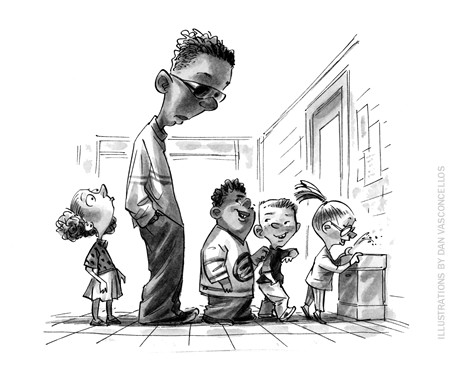- This pertains to the practice of promoting students to the next grade level even when they have not learned the material they were taught or achieved expected learning standards.
- Frequently contrasted with retention, which is the practice of holding students back and making them repeat a grade when they fail to meet academic expectations, or strategies such as proficiency-based learning, which may require students to demonstrate they have achieved academic expectations before they are promoted to the next grade level.
Considerations for Social Promotion:
- These are usually non-academic aspects
- Societal pressures
- Educators may not want to damage a student’s self-esteem or put him or her at greater risk of suffering from the social, emotional, behavioral, and psychological problems often associated with grade retention.
- Societal expectations
- Educators and parents do not want to separate a young student from his or her friends or peer group, a school or community may not want a top athlete to lose his or her eligibility to play sports, or schools may not want to experience the consequences and public embarrassment that may result if significant numbers of students are held back.
***In these cases, promoting students, even though they did not meet academic requirements, is perceived to be in the best interests of the student. In a word, social promotion may result from a various educational, cultural, and socioeconomic causes.
Criticisms on Social Promotion
- Allowing academically unprepared students to be promoted is not only unfair to the other students, but it can worsen the problems associated with the practice. For example, students are likely to fall further and further behind academically, which can increase the chances that they will not cope with their peers and drop out of school before graduating.
- Teachers will have to spend more time on the unprepared students and this will increasingly burden the teachers. As a consequence, the prepared students will not have enough attention and instruction they deserve. Or conversely, the unprepared students will require more of a teacher’s time and attention, which can negatively affect instructional quality for prepared students.
- Social promotion sends numerous messages to students. Students might believe that meeting expectations is optional, low-quality work is acceptable, or failure will still be rewarded. This could have negative long-term consequences for both the students and society. When social promotion becomes institutionalized or widespread, it can also mislead parents, policy makers, and the public into believing that students are making adequate progress in school and succeeding academically, when in fact their academic development may be masking deeper, underlying problems in the system.
- Social promotion keeps students in the similar type of educational settings, courses, and programs that are simply not working for them. In this case, if learning needs were being accurately diagnosed, the rationale goes, students could be placed into alternative courses and programs where they would be more likely to receive the kind of instruction and support they need to succeed in school (rather than being forced to retake the same courses that did not work the first time around, which may happen in the case of grade retention).
- Holding all students to high academic expectations increases their academic attainment and preparation, no matter where they started from, or that strong teaching and academic support can accelerate learning progress by months or years, thereby avoiding the need to socially promote students.
Arguments Supporting Social Promotion
- Social promotion may be beneficial to students in certain cases and that holding students back and making them repeat grades can have a variety of negative consequences such as it will separate students from their natural peer group; it may increase the chances that they will suffer academically or drop out of school; it may increase the likelihood that they will struggle from low self-esteem, ridicule, and bullying; or it can increase the risk of social, emotional, behavioral, and psychological problems. Therefore, grade retention can have a variety of adverse effects on students, and that in many cases grade retention does not work—students who are held back often never catch up with their peers, and they are at a greater risk of dropping out during adolescence.
- The costs associated with grade retention can be significant, since holding students back effectively adds a year to the total cost of teaching those students (assuming the students remain in school). In this case, social promotion may result from financial pressures and logistical concerns, such as the increased costs and operational difficulties associated with holding students back or providing them with the additional teaching and services they need to comply with academic expectations.
